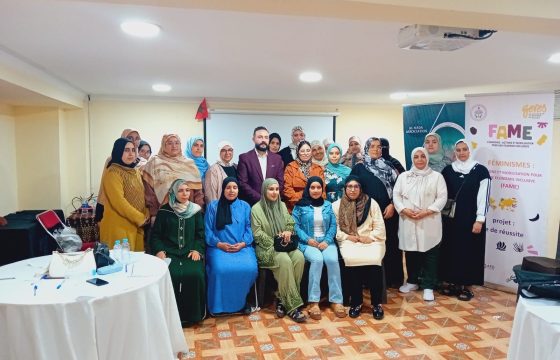Introduction
Between 12 and 29 May 2025, a field mission was carried out by the FAME project officer at Geres Maroc to the 9 civil society organisations (CSOs) working in the field of women’s empowerment in Morocco and funded by the FAME project under the first Call for Expressions of Interest.
These visits are part of the follow-up to the FAME programme and cover a wide geographical spectrum, from Casablanca to Errachidia, including rural areas affected by the Al Haouz earthquake. The cities where the projects supported by FAME are currently taking place are Casablanca, Mohammedia- Ain Harrouda, Tangiers, Marrakech, Fez, Errachidia and Rabat.
The aim was to observe the activities carried out since the projects were launched in March 2025, to assess the quality of the interventions and to identify the challenges faced by these grassroots players in their missions to support women towards economic and social empowerment.
Diversity of approaches and target audiences
Three main areas of intervention
The CSOs visited identified several major obstacles to women’s economic empowerment in Morocco. Firstly, the lack of entrepreneurial skills: many women have project ideas but do not know how to structure them, draw up a business plan or access funding. Secondly, psychological barriers are omnipresent: lack of self-confidence, fear of failure, fear of losing social assistance. Lastly, social and family resistance is a major obstacle, particularly ignorance of women’s rights and pressure from spouses or families that discourage women’s initiatives.
In response to these challenges, CSOs are focusing their responses on three complementary areas:
Support for economic initiatives is at the heart of their work, with approaches varying according to the context. For example, the Al Nada Association in Mohammedia focuses on training in project development and support for self-entrepreneurship, reaching around twenty women with diverse profiles. Another example: the Diyaa Cooperative in Tangier is developing income-generating activities in agriculture, involving 70% rural women among its 30 members.
Psychosocial support is an essential prerequisite. For example, AMAFF in Casablanca is developing workshops on self-esteem, creating a caring environment that encourages women to speak out and build their self-confidence. In the post-earthquake context in Asni, the Ennakhil Association systematically includes a psychological component to help overcome obstacles.
Raising awareness of rights is the third pillar, as illustrated by the NABTA association, which runs sessions on human rights and gender equality, reaching 24 women in an inclusive approach that also includes men.
Adapting to local contexts
The effectiveness of our initiatives depends to a large extent on adapting them to local conditions. The use of Amazigh by the Ennakhil Association in the Asni region is proving to be a key to success in guaranteeing accessibility and local roots. This attention to language and cultural codes is reflected in all the interventions observed, where dialectal Arabic dominates the exchanges.
Quality of interventions: strengths observed
Appropriate methodology
The CSOs visited demonstrated a real mastery of methodology. IPDF stands out for its participatory co-construction approach, involving 25 beneficiaries and numerous institutional players (CRI, ANAPEC, OFPPT, INDH) in an integrated support system. This method makes it possible to build a shared vision and ensure that beneficiaries take ownership of the solutions.
The NABTA Association illustrates the effectiveness of a tailored teaching approach, with interactive presentations, dynamic question-and-answer exchanges and the use of post-assessment sheets to measure what has been learnt. This approach generates a high level of interaction and helps to anchor learning in the participants’ own lives.
Inclusion and diversity
Inclusion is a key feature of the interventions observed. The NABTA association includes men in its workshops on gender equality, encouraging mixed exchanges. The Al Nada association welcomes women from a neighbouring district who have expressed needs, in addition to the initial target groups, demonstrating a capacity for adaptation and openness.
Acting on the causes of the lack of economic inclusion
The testimonials gathered illustrate the projects’ ambition to bring about far-reaching changes: “Women are harassed every day on their way to and from work. They don’t talk about it for fear of losing their jobs, their husbands or their families. This silence is heavy, and we really want to break this taboo and combat this violence”, confided the director of ATEC during the Assises du féminisme.
Collective dynamics and advocacy
Spaces for consultation and collective advocacy
The “Assises du féminisme” conference organised by APCE in Rabat demonstrated the importance of dialogue between different players. This annual event on the status of women in Morocco brought together a large number of participants over two days: feminist associations, public figures, specialists and professionals from various fields (law, medicine, economics, management, institutional representatives). Discussions focused on economic inequality, job insecurity and continuity of funding.
The event provided an opportunity to co-construct feminist advocacy based on field experience, with recommendations formulated by each CSO. This collective approach strengthens the advocacy capacity of the organisations and enables them to articulate common positions to institutions and donors.
Conclusion
This field mission reveals a dynamic and committed ecosystem of CSOs, developing innovative approaches adapted to local contexts. The quality of the interventions observed bears witness to the growing professionalisation of the sector and its ability to respond to the diverse needs of Moroccan women.
Above all, these visits are an opportunity to establish a relationship of trust with the teams, to exchange first impressions of FAME and to lay the foundations for the diagnosis that will guide the rest of the support. Some CSOs are already organising training courses, others are carrying out advocacy or awareness-raising activities… What they all have in common is a real desire to take action for women’s rights.





